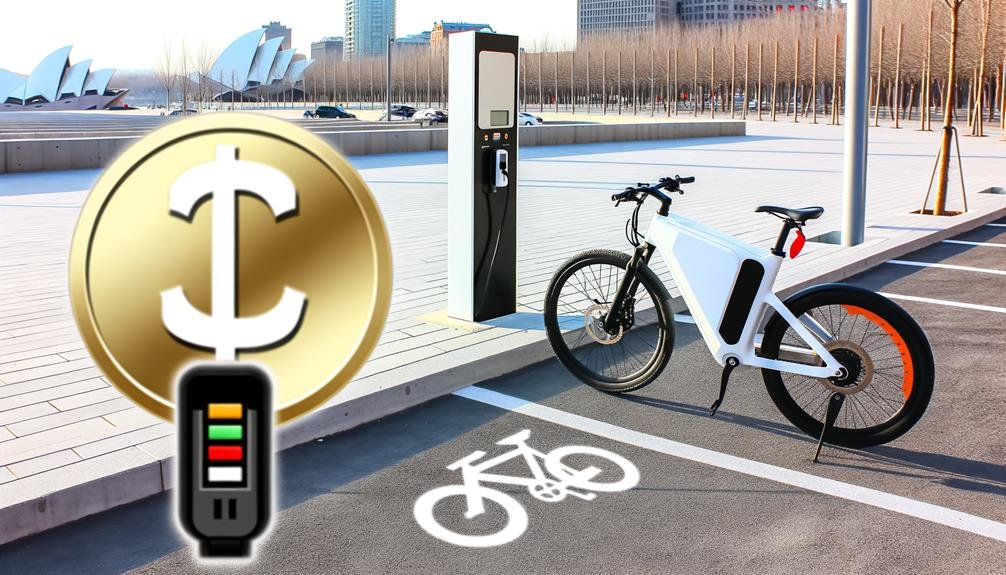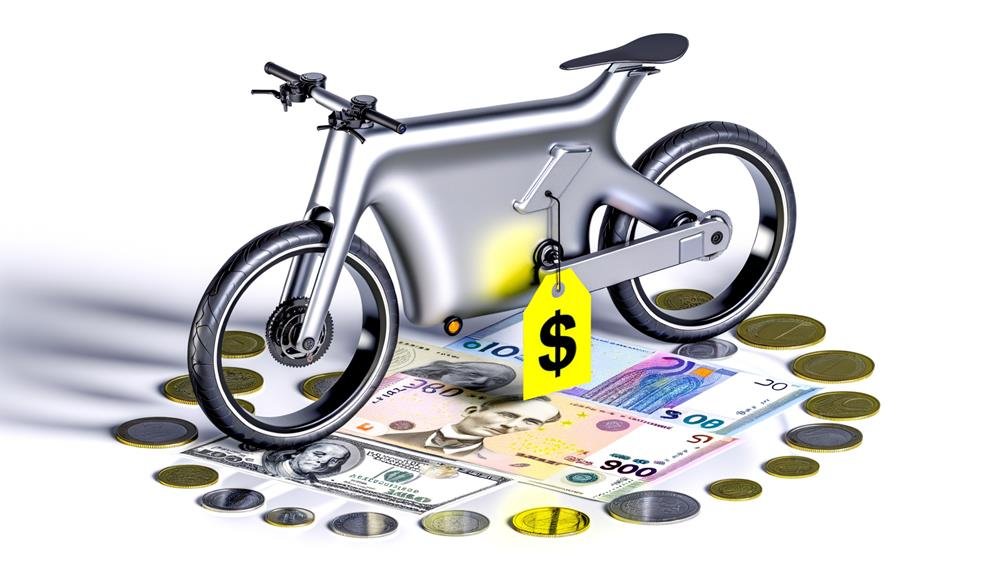Charles Miller is a veteran bike enthusiast with over 12 years of experience dealing with bikes as a mechanic. Despite immense love and expertise for...
A discussion on the utility of electric bikes often revolves around the degree of assistance they provide to the rider. This assistance, quantifiable and adjustable, can be a game-changer for both novices seeking a comfortable start and seasoned cyclists aiming to augment their fitness goals.
As empirical evidence suggests, the frequency and distance covered by e-bike riders surpasses that of traditional cyclists, opening an intriguing dialogue on how this technology might be reshaping the landscape of personal mobility.
However, to fully comprehend the potential benefits and implications of this increasing trend, one needs to probe deeper into the multifaceted dynamics of electric bikes.
Key Takeaways
- Electric bikes provide various levels of support, allowing riders to adjust the level of assistance they receive.
- E-bikes make it easier to navigate hilly routes, making cycling more accessible to a wider range of individuals.
- E-bikes offer health benefits such as enhanced cardiovascular health, weight management, and improved mental wellness.
- Electric bikes are cost-efficient, with low operational and maintenance costs, as well as potential tax incentives and lower insurance rates compared to cars.
Understanding Electric Bike Mechanics
In order to fully comprehend the mechanics of electric bikes, it is crucial to first understand the varying levels of assistance they offer, which significantly impact the user's riding experience and potential health benefits.
Electric bikes, or e-bikes, are engineered to provide various levels of support, allowing riders to adjust their ride to be easier or more challenging. This level of support plays a significant role in the overall understanding of electric bike mechanics.
E-bike riders typically experience lower perceived exertion, making it easier to navigate hilly routes and maintain better physical condition during rides. This powerful feature allows individuals with health issues to continue riding, keeping pace with fitter riders, which contributes significantly to physical and mental well-being.
Moreover, e-bikes offer cardiovascular benefits that rival those of non-assisted bikes, as the motor only kicks in after the rider starts pedaling. Class 1 e-bikes, in particular, which offer pedal assistance up to 20 mph, are highly recommended for maximizing exercise benefits and promoting physical activity.
This intricate balance of user effort and mechanical assistance is fundamental to understanding electric bike mechanics.
Health Benefits of E-Bikes
The health benefits of e-bikes extend beyond mere transportation efficiency, impacting both physical and mental well-being.
The correlation between e-bike use and cardiovascular health enhancement, weight management, and mental wellness merits rigorous examination.
In the following analysis, we will explore these specific benefits, providing a comprehensive overview of the impact of e-bikes on individual health.
E-Bikes and Cardiovascular Health
Harnessing the power of e-bikes not only promotes sustainable transportation but also provides significant cardiovascular benefits akin to those experienced by riders of traditional, non-assisted bicycles.
The direct correlation between e-bikes and cardiovascular health lies in the pedaling action, which increases heart rate, similar to the exertion levels in conventional cycling. This heart rate elevation enhances fitness gains and promotes overall health.
Moreover, riding an electric bike spurs riders to cycle more frequently and traverse larger distances, amplifying these benefits of cycling.
Particularly, Class 1 e-bikes, which assist pedaling up to 20 mph, are commendable for their efficacy in promoting physical activity, presenting a viable option for individuals with health issues to maintain an active lifestyle.
Mental Wellness With E-Bikes
Beyond the physical health benefits, e-bikes also offer substantial mental wellness advantages. They provide an accessible mode of exercise that can alleviate stress, reduce anxiety, and enhance overall happiness.
When you ride an electric bike, you engage in a low-impact cardiovascular activity that simultaneously stimulates the mind. The ebike's motor assists in maintaining a consistent pace, enabling longer rides which promote a sense of accomplishment. This feeling of achievement is a crucial aspect of mental wellness with e-bikes.
Riding an ebike can also induce a meditative state, as the rhythmic pedaling and focused attention on the road can push aside daily anxieties and stressors.
In essence, electric bikes offer a unique blend of physical activity and mental tranquility, thereby improving overall mental well-being.
E-Bikes for Weight Management
In addition to its substantial mental wellness advantages, the electric bike plays a pivotal role in weight management and overall physical health, offering customizable assistance levels that can adapt to individual fitness goals. Despite the help from electric motors, riders still have to pedal, ensuring that e-bikes for weight management remain an effective method of exercise.
- Low-Impact Exercise: E-bikes provide assistance, reducing strain on joints while still offering cardiovascular benefits.
- Controlled Intensity: By adjusting assistance levels, riders can tailor their workouts to their fitness level and goals.
- Increased Usage: With the comfort and convenience of an electric bike, riders are more likely to cycle frequently, increasing their overall physical activity.
E-Bikes and the Environment
The environmental impact of electric bikes, often overlooked, warrants a comprehensive discussion due to its extensive implications on sustainability and carbon footprint reduction. E-bikes, when compared to conventional modes of transportation, significantly contribute towards the reduction of carbon emissions. One particular study by Brigham Young University found that e-bike usage could potentially replace up to 46% of car trips in urban areas, leading to a substantial decrease in greenhouse gas emissions.
E-bikes allow individuals to travel longer distances with less effort, promoting eco-friendly commuting especially in densely populated areas. Moreover, the energy efficiency of e-bikes surpasses that of traditional bikes, with less energy expenditure per kilometre.
| Parameter | Impact |
|---|---|
| Carbon Emission | Reduction |
| Urban Car Trips | Can replace up to 46% |
| Energy Efficiency | Higher than traditional bikes |
| Commuting Distance | Greater with less effort |
Indeed, the relationship between e-bikes and the environment is one of mutual benefit – the adoption of e-bikes fosters environmental sustainability, while the environment gets a reprieve from the pressure of carbon emissions.
Cost Efficiency of Electric Bikes

While the environmental benefits of e-bikes are considerable, their cost efficiency presents another compelling advantage, particularly for short to medium distance travel. Electric bikes provide a remarkably affordable mode of transportation, largely due to their low operational and maintenance costs.
Consider the following points exploring the cost efficiency of electric bikes:
- Fuel and Maintenance Savings: Unlike traditional bike riding, e-bikes require minimal physical exertion, saving costs on food as a fuel source. Electric bikes are remarkably cost-efficient in their energy consumption, averaging 39 miles per charged battery. Furthermore, e-bikes require less frequent and costly maintenance compared to motor vehicles.
- Tax and Insurance Benefits: Many jurisdictions offer tax incentives for electric bike ownership, further increasing their cost efficiency. Insurance for e-bikes is also typically lower than for cars, contributing to long-term savings.
- Reduced Transportation Expenses: The cost per mile of riding an electric bike is significantly lower than using a motor vehicle. This, coupled with savings on parking fees and the ability to avoid traffic, makes the electric bike an economically superior choice for short to medium distance commutes.
Storage and Convenience Factors
Equipped with advanced technology and innovative features, electric bikes offer an unparalleled level of storage convenience and efficiency for urban commuters and fitness enthusiasts alike. These bikes are designed to provide an optimal balance between mobility and storage, assisting riders in their daily commute or fitness routine.
The convenience of e-bikes is evident in their ability to be easily stored in compact spaces, making them particularly suitable for city dwellers. Being lightweight and often foldable, these bikes enable riders to navigate through crowded places with ease. E-bike riders can store their bikes indoors, protecting them from adverse weather conditions and theft.
Additionally, the advanced technology used in these bikes is tailored to provide an efficient riding experience. The power assistance function allows riders to adjust the level of help based on their needs. This feature makes it possible for people with different fitness levels to be able to ride comfortably.
Mental Health Advantages

In addition to the convenience and efficiency offered by electric bikes, significant mental health advantages also emerge from their usage, further enhancing their appeal. Research indicates that the act of cycling, albeit with less physical strain due to the electric assistance, can contribute to improved mental health. This includes the reduction of anxiety and stress levels and the promotion of greater happiness.
The mental health advantages of e-bike riding can be outlined as follows:
- Exercise: The fact that e-bike riding involves much exercise means that e-bike riders can reap the mental health benefits associated with regular physical activity. This includes improved mood and reduced stress levels.
- Outdoor Activity: Studies have shown that e-bike riders, like riders of non-assisted bikes, can benefit from the positive mental health effects of spending time outdoors. This can lead to improved mood and better sleep.
- Inclusion and Belonging: The accessibility of e-bikes can foster a sense of inclusion and belonging, which are vital for mental well-being.
These factors combine to make electric biking a potent tool for promoting mental health, further augmenting its appeal.
Frequently Asked Questions
How Much Assistance Does an Ebike Give You?
An ebike's assistance depends on factors such as battery longevity, motor power, terrain, and speed control options. Pedal assist levels can be adjusted, impacting the degree of effort required and the overall riding experience.
How Useful Is an Electric Bike?
Electric bikes offer affordability, ease of maintenance, and charging convenience. With substantial battery lifespan, they contribute to environmental sustainability. They provide a sense of community for users, transforming transportation into an engaging, eco-conscious experience.
How Much Does an Electric Bike Assist You?
An electric bike's assistance depends on its efficiency, battery lifespan, terrain adaptability, maintenance, and speed capabilities. It can add up to 250% assistance to the rider's effort, enhancing mobility and promoting physical activity.
Do Electric Bikes Give You Any Exercise?
Electric bikes indeed provide exercise, inducing a significant increase in exercise intensity and workout variety. They offer substantial health benefits, including a positive cardiovascular impact and notable calorie burn, facilitating an active and inclusive lifestyle.
Conclusion
In conclusion, electric bikes have the potential to revolutionize transportation. They provide substantial health and environmental benefits, offer cost efficiency, and add convenience. With their ability to provide up to 250% assistance, e-bikes are not just a flash in the pan. Moreover, they also contribute positively to mental health. E-bikes can contribute significantly towards increased riding frequency, improved health outcomes, and a more sustainable model of mobility.

Charles Miller is a veteran bike enthusiast with over 12 years of experience dealing with bikes as a mechanic. Despite immense love and expertise for his Tacoma, he rides his Trek Ebike more. Anytime you meet him, you’ll either hear him talking about Bikes, or writing about all things bikes and cars on this blog.
More Posts


